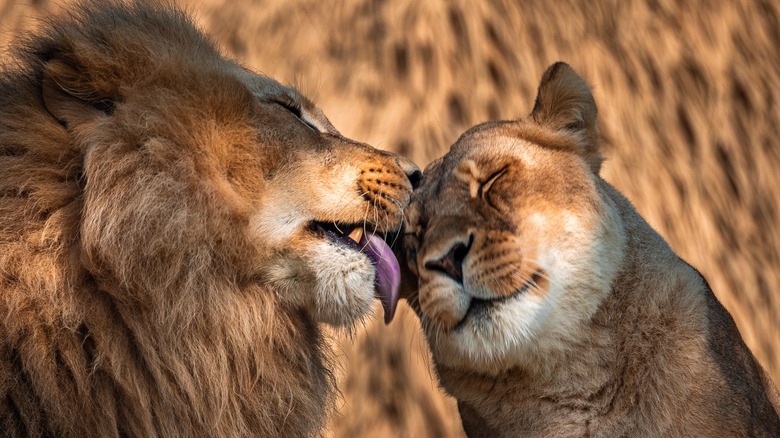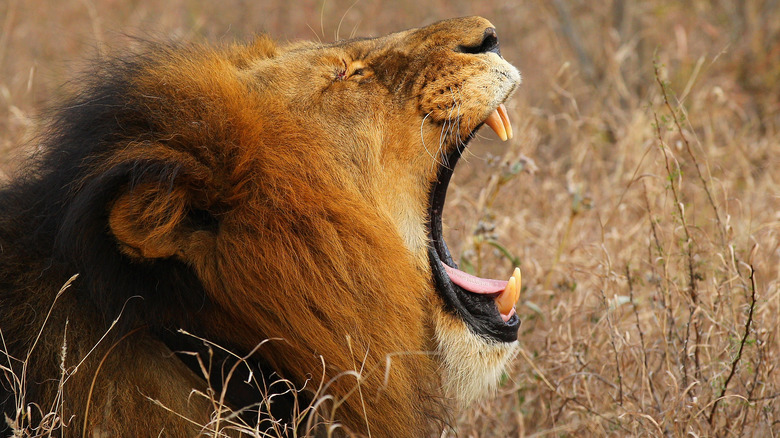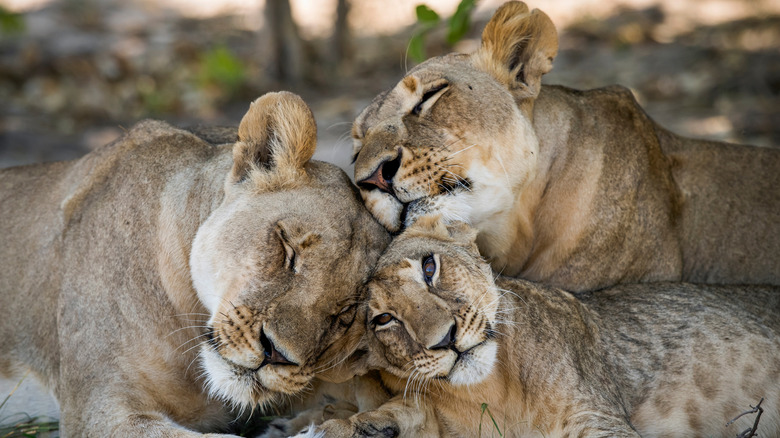A Lion's Tongue Is Stronger Than You Think
Lions are absolutely iconic. From the roar at the beginning of classic MGM films, to James Earl Jones' majestic performance as Mufasa in "The Lion King," they have had a special place in the hearts of generations. As Simba's ever-wise father taught us, lions are formidable animals, to be respected and, when messed with, absolutely to be feared, too. So don't mess with them.
Like domestic kitties, they can be very affectionate when they want to be. On their terms, of course. Though the claws of housecats aren't exactly comparable to those of the average lion, they can certainly do some terrible damage. Not only to soft furnishings or your most prized tabletop possessions, either. Nor are they afraid to use them.
Even when they're loving rather than claw-ing, though, our beloved furballs have another weapon. The tongue of a pet cat, per PetMD, is coated with papillae, an array of tiny hook-like protrusions. It's a biological feature domesticated cats share with lions. Those papillae have a frightening purpose.
The powerful papillae of lions
Both big cats and cute pet kitties are hunters. They are slender, agile, vicious, prey-pursuing machines. You might not know it from your beloved pet's tendency to squeeze itself into a cardboard box and sleep there for most of a week, but that's how it is. As such, their bodies are adapted in the most deadly of ways.
That tongue, according to the Virginia-Maryland College of Veterinary Medicine's Dr. Mark Freeman (via PetMD), is part of that hunting package. Freeman reports, "when they catch prey, the papillae literally help cats strip flesh from bones, extracting the maximum amount of nutrition from their catch, and direct it to the back of the mouth." Freeman further states that these papillae help with other processes, like the vigorous coat-grooming our feline friends insist upon, but the message is clear: You don't want a tongue-lashing from a cat.
Lions are a good deal larger than the average kitty cat. National Geographic reports that the African lion can weigh up to 420 pounds, and is up to 6-and-a-half feet long. Their tongues, too, are frightening flesh-strippers.
A rather modest bite, but a deadly tongue
A lion's mouth is a more-than-frightening-enough prospect to consider as it is. The bite force of a lion, according to Field & Stream, might be a relatively modest 650 PSI (it's reportedly 1,500 PSI for a jaguar and a ludicrous 3,700 PSI for a saltwater crocodile), but its teeth and claws are sure to make quick work of any target.
What if the lion decides you aren't on the menu, and it just wants to give you a friendly lick instead? Well, be wary: You won't be able to take many of those expressions of affection. According to Lion Alert, those papillae on a lion's tongue are just as effective for grooming and eating purposes as they are for their kitty cousins. It's rather like being licked by coarse sandpaper, says Animal Food Planet. Within a couple of licks, they'll strip the flesh from a human's bones. While a lion's tongue isn't as impressive in length as that of other iconic African animals (a giraffe's tongue is around 20 inches long, according to the Giraffe Conservation Foundation), it's remarkable and deadly in its own way. It's quite capable of licking its prey all the way down to the bone.


